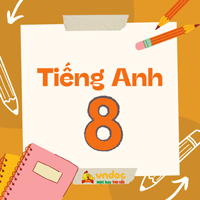Từ vựng Unit 7 lớp 8 Pollution
Tài liệu Từ vựng tiếng Anh lớp 8 Unit 7 Pollution dưới đây nằm trong tập tài liệu Từ vựng Tiếng Anh lớp 8 chương trình mới theo từng Unit do VnDoc.com đăng tải. Mời Thầy cô, Quý phụ huynh và các em học sinh tham khảo, download để thuận tiện cho việc học tập và giảng dạy!
Từ vựng tiếng Anh Unit 7 lớp 8 Pollution
I. Từ vựng tiếng Anh 8 unit 7 Pollution
| Từ vựng |
Phân loại |
Phiên âm |
Định nghĩa |
|
acid rain |
n |
/æsɪd reɪn/ |
mưa axit |
|
advertising billboard |
n |
/ˈædvətaɪzɪŋ ˈbɪlbɔːd/ |
biển quảng cảo |
|
affect |
v |
/əˈfekt/ |
gây ảnh hưởng |
|
air pollution |
n |
/eər pəˈluːʃn/ |
ô nhiễm không khí |
|
aquatic |
adj |
/əˈkwætɪk/ |
sống ở dưới nước |
|
atmosphere |
n |
/ˈætməsfɪər/ |
bầu không khí |
|
behaviour |
n |
/bɪˈheɪvjər/ |
hành vi |
|
believe |
v |
/bɪˈliːv/ |
tin tưởng |
|
birth defect |
n |
/bɜːθ ˈdiːfekt/ |
khuyết tật bẩm sinh |
|
blood pressure |
n |
/blʌd ˈpreʃər/ |
huyết áp |
|
breathing problem |
n |
/ˈbriːðɪŋ ˈprɒbləm/ |
vấn đề thở |
|
change |
v |
/tʃeɪndʒ/ |
thay đổi, sự thay đổi |
|
chemical |
adj |
/ˈkemɪkəl/ |
thuộc hóa học |
|
come up with |
v |
/kʌm ʌp wɪð/ |
nghĩ ra |
|
complain |
v |
/kəmˈpleɪn/ |
phàn nàn |
|
contain |
v |
/kənˈteɪn/ |
chứa đựng |
|
contaminant |
n |
/kənˈtæmɪnənt/ |
chất gây ô nhiễm |
|
continue |
v |
/kənˈtɪnjuː/ |
tiếp tục |
|
decrease |
v |
/dɪˈkriːs/ |
làm giảm |
|
dirty |
adj |
/ˈdɜːti/ |
bẩn thỉu |
|
discharge |
v, n |
/dɪsˈtʃɑːdʒ/ |
sự dỡ hàng, sự tháo ra |
|
disease |
n |
/dɪˈziːz/ |
bệnh tật |
|
dramatic |
adj |
/drəˈmætɪk/ |
nghiêm trọng |
|
dump |
v |
/dʌmp/ |
đổ, vứt bỏ |
|
dust |
n |
/dʌst/ |
bụi |
|
earth’s surface |
n |
/ɜːθ ˈsɜːfɪs/ |
bề mặt trái đất |
|
environmental |
adj |
/ɪnˌvaɪrənˈmentəl/ |
thuộc môi trường |
|
expose |
v |
/ɪkˈspəʊz/ |
tiếp xúc |
|
factory |
n |
/ˈfæktəri/ |
nhà máy |
|
float |
v |
/fləʊt/ |
nổi |
|
fume |
n |
/fjuːm/ |
khói thải |
|
gas |
n |
/ɡæs/ |
khí, dầu xăng |
|
give presentation |
v |
/ɡɪv prezənˈteɪʃən/ |
thuyết trình |
|
global warming |
n |
/ˈɡləʊbəl ˈwɔːmɪŋ/ |
sự nóng lên toàn cầu |
|
ground water |
n |
/ɡraʊnd ˈwɔːtər/ |
nước ngầm |
|
harmful |
adj |
/ˈhɑːmfəl/ |
có hại |
|
hearing loss |
n |
/ˈhɪərɪŋ lɒs/ |
sự mất khả năng nghe |
|
herbicide |
n |
/ˈhɜːbɪsaɪd/ |
thuốc diệt cỏ |
|
home village |
n |
/həʊm ˈvɪlɪdʒ/ |
quê nhà |
|
household |
n, adj |
/ˈhaʊshəʊld/ |
hộ gia đình, thuộc gia đình |
|
illustrate |
v |
/ˈɪləstreɪt/ |
minh họa |
|
industrial |
adj |
/ɪnˈdʌstriəl/ |
thuộc về công nghiệp |
|
issue |
n |
/ˈɪʃuː/ |
vấn đề |
|
land/soil pollution |
n |
/lænd/sɔɪl pəˈluːʃən/ |
ô nhiễm đất |
|
lead to |
v |
/lɪːd tuː/ |
dẫn tới |
|
light pollution |
n |
/laɪt pəˈluːʃən/ |
ô nhiễm ánh sáng |
|
litter |
v |
/lɪtər/ |
xả rác, rác |
|
noise pollution |
n |
/nɔɪz pəˈluːʃən/ |
ô nhiễm tiếng ồn |
|
occur |
v |
/əˈkɜːr/ |
xảy ra |
|
ocean |
n |
/ˈəʊʃən/ |
đại dương |
|
pattern |
n |
/ˈpætən/ |
kiểu mẫu, gương mẫu |
|
poison |
n |
/ˈpɔɪzən/ |
chất độc |
|
poisonous |
adj |
/ˈpɔɪzənəs/ |
có độc, nhiễm độc |
|
polluted |
adj |
/pəˈluːtɪd/ |
bị ô nhiễm |
|
pollution |
n |
/pəˈluːʃən/ |
sự ô nhiễm |
|
radioactive pollution |
n |
/reɪdiəʊˈæktɪv pəˈluːʃən / |
ô nhiễm phóng xạ |
|
recycle |
v |
/riːˈsaɪkl/ |
tái chế |
|
reduction |
n |
/rɪˈdʌkʃən/ |
sự rút gọn, sự giảm |
|
renewable |
adj |
/rɪˈnjuːəbl/ |
làm mới được, tái sinh được |
|
river |
n |
/rɪvər/ |
dòng sông |
|
rubbish |
n |
/ˈrʌbɪʃ/ |
rác thải |
|
serious |
adj |
/ˈsɪəriəs/ |
nghiêm trọng |
|
sneeze |
v |
/sniːz/ |
hắt hơi |
|
spill |
v |
/spɪl/ |
làm tràn, làm đổ |
|
stream |
n |
/ˈstriːm/ |
dòng suối |
|
thermal pollution |
n |
/ˈθɜːməl pəˈluːʃən/ |
ô nhiễm nhiệt |
|
throw |
v |
/θrəʊ/ |
ném, vứt |
|
tiny species |
n |
/ˈtaɪni ˈspiːʃiːz/ |
những sinh vật nhỏ |
|
untidy |
adj |
/ʌn ˈtaɪdi/ |
lôi thôi, lếch thếch |
|
vehicle |
n |
/ˈviːɪkl/ |
phương tiện giao thông |
|
visual pollution |
n |
/ˈvɪʒuəl pəˈluːʃən/ |
ô nhiễm tầm nhìn |
|
waste |
n |
/weɪst/ |
chắt thải |
|
water pollution |
n |
/ˈwɔːtər pəˈluːʃən/ |
ô nhiễm nước |
|
weed |
n |
/wiːd/ |
cỏ dại |
II. Bài tập từ vựng unit 7 lớp 8 Pollution có đáp án
Choose the word(s) CLOSEST in meaning to the underlined words in each of the following questions.
1. The augmentation in the population has created a fuel shortage.
A. increase B. necessity C. demand D. Decrease
2. If we had taken his sage advice, we wouldn’t be in so much trouble now.
A. willing B. sturdy C. wise D. eager
3. I think we have solved the problems of environmental pollution once and for all.
A. forever B. for goods C. temporarily D. in the end
4. He was asked to account for his actions to pollute the environment.
A. complain B. exchange C. explain D. arrange
5. The teacher gave some suggestions on what could solve the problems of water pollution
A. effects B. symptoms C. hints D. demonstrations
Choose the word(s) OPPOSITE in meaning to the underlined words in each of the following questions.
1. There is growing concern about the way man has destroyed the environment.
A. ease B. attraction C. consideration D. speculation
2. The distinction between schooling and education implied by this remark is important.
A. explicit B. implicit C. obscure D. odd
3. Population growth rates vary among regions and even among countries within the same region.
A. restrain B. stay unchanged C. remain unstable D. fluctuate
4. I clearly remember talking to him in a chance meeting last summer.
A. unplanned B. deliberate C. accidental D. unintentional
5. The International Organizations are going to be in a temporary way in the country.
A. soak B. permanent C. complicated D. guess
Match each type of pollution with its definition, writing the answer in each.
|
Types of pollution |
Definitions |
|
1. Air pollution 2. Land pollution
3. Light pollution 4. Noise pollution 5. Thermal pollution 6. Visual pollution 7. Water pollution 8. Radioactive pollution
|
A. the increase of temperature caused by human activity B. the contamination of any body of water, such as lakes, groundwater, oceans, etc. C. the contamination of air by smoke and harmful gases. D. the release of unwanted radioactive material into the environment. E. The brightening of the night sky preventing us from seeing stars by improper lighting of communities. F. the destruction of the earth’s surface caused by the misuse of resources and improper dumping of G. anything unattractive or visually damaging to the nearby H. any loud sounds that are either harmful or annoying to humans and animals. |
ĐÁP ÁN
Choose the word(s) CLOSEST in meaning to the underlined words in each of the following questions.
1 - A; 2 - C; 3 - A; 4 - C; 5 - C;
Choose the word(s) OPPOSITE in meaning to the underlined words in each of the following questions.
1 - A; 2 - A; 3 - B; 4 - B; 5 - B;
Match each type of pollution with its definition, writing the answer in each.
|
Types of pollution |
|
Definitions |
|
1. Air pollution 2. Land pollution
3. Light pollution 4. Noise pollution 5. Thermal pollution 6. Visual pollution 7. Water pollution 8. Radioactive pollution |
1 - C 2 - F 3 - E 4 - H 5 - A 6 - G 7 - B 8 - D |
A. the increase of temperature caused by human activity B. the contamination of any body of water, such as lakes, groundwater, oceans, etc. C. the contamination of air by smoke and harmful gases. D. the release of unwanted radioactive material into the environment. E. The brightening of the night sky preventing us from seeing stars by improper lighting of communities. F. the destruction of the earth’s surface caused by the misuse of resources and improper dumping of G. anything unattractive or visually damaging to the nearby H. any loud sounds that are either harmful or annoying to humans and animals. |
Trên đây là toàn bộ Từ vựng Tiếng Anh Unit 7 Tiếng Anh lớp 8 mới Pollution. Với mong muốn giúp các em học sinh lớp 8 ôn tập Ngữ pháp Tiếng Anh và Từ vựng Tiếng Anh hiệu quả, mời bạn đọc tham khảo thêm tài liệu luyện tập Tiếng Anh lớp 8 tại đây: Bài tập Tiếng Anh lớp 8 theo từng Unit mới nhất.
>> Xem thêm: Soạn tiếng Anh lớp 8 unit 7 Pollution chi tiết nhất









